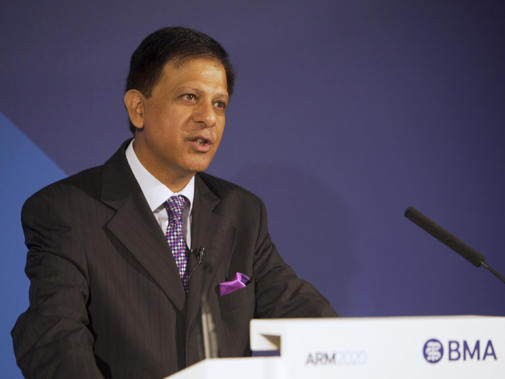In the early days of the COVID-19 pandemic the Government promised to give the NHS ‘everything’ it needed to face the crisis.
And with more than three million people in England alone now waiting for elective procedures as a result of the NHS effectively becoming a national COVID service, doctors at the BMA annual representative meeting have said it is now time for ministers to honour their pledges in dealing with the impact of the pandemic.
Delegates attending the ARM – held virtually this year, for the first time – passed policy demanding the Government provide adequate funding to create capacity to deal with the backlog. They called for the return of public funds paid to the for-profit sector to retain capacity under-used during the pandemic.
The meeting also agreed that the BMA should work with the Government to develop a public information campaign on the NHS backlog and likely timescale for returning to normal services.
BMA council chair Chaand Nagpaul (pictured) said: ‘During the height of the pandemic, services needed to be overhauled to manage the influx of COVID-19 patients – but this came at the expense of care for many other patients, who were forced to have treatment delayed.’
Dr Nagpaul said the delays had left millions of patients in limbo. ‘Doctors are naturally deeply concerned about these patients, and the Government has a duty to the public to be honest about the scale of the backlog and how long it will take to clear – informed by the experiences of clinicians on the ground,’ he said.
The upcoming spending review provides a vital opportunity for the GovernmentChaand Nagpaul, BMA council chair
In July, a BMA report revealed the sheer scale of the hidden impact of the COVID-19 pandemic – with millions of patients not receiving planned operations, treatments and appointments.
It is a problem followed by great consequences. NHS England data for June shows waiting lists for treatment increasing and unmet care rising, with the number of people waiting over one year for treatment 46 times its normal value in June. And the statistics suggest the majority of patients are likely now waiting more than four months for treatment.
Dr Nagpaul added: ‘While the Government pledged to give the NHS “everything it needed” to fight the early days of the outbreak in Britain, it must now do the same in ensuring the health service has the capacity to address the growing backlog in care, backed by guaranteed investment. The upcoming spending review provides a vital opportunity for the Government to commit to additional funding, and in doing so prove its commitment to the NHS and the health of the public.’

